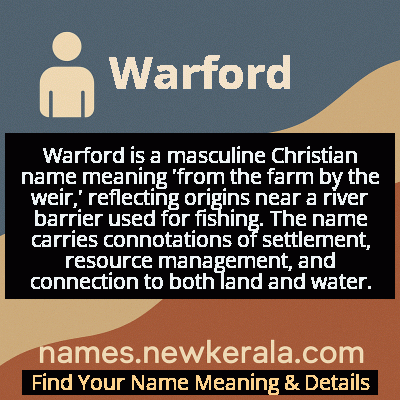Warford Name Meaning & Details
Origin, Popularity, Numerology Analysis & Name Meaning of Warford
Discover the origin, meaning, and cultural significance of the name WARFORD. Delve into its historical roots and explore the lasting impact it has had on communities and traditions.
Name
Warford
Gender
Male
Origin
Christian
Lucky Number
4
Meaning of the Name - Warford
Warford is a masculine Christian name meaning 'from the farm by the weir,' reflecting origins near a river barrier used for fishing. The name carries connotations of settlement, resource management, and connection to both land and water.
Warford - Complete Numerology Analysis
Your Numerology Number
Based on Pythagorean Numerology System
Ruling Planet
Uranus (Rahu)
Positive Nature
Strong sense of order, loyal, practical, and disciplined.
Negative Traits
Stubborn, overly serious, rigid, and prone to feeling restricted.
Lucky Colours
Blue, gray.
Lucky Days
Saturday.
Lucky Stones
Blue sapphire.
Harmony Numbers
1, 7, 8.
Best Suited Professions
Managers, engineers, accountants, organizers.
What People Like About You
Dependability, discipline, practicality.
Famous People Named Warford
Warford Johnson
American football player
Professional NFL player known for his defensive skills and team leadership
Samuel Warford
Clergyman and educator
Prominent Baptist minister and founder of religious educational institutions
James Warford
Educator and administrator
Notable education commissioner and reform advocate in Southern states
Thomas Warford
Military officer
British Army officer serving in colonial America during early settlement periods
Name Variations & International Equivalents
Click on blue names to explore their detailed meanings. Gray names with will be available soon.
Cultural & Historical Significance
The cultural significance of Warford extends beyond its English origins to represent a broader European tradition of naming children after geographical features that defined community life. In Christian contexts, the name embodies the Protestant work ethic and the theological concept of stewardship - the responsible management of God's creation. The weir and farm elements symbolize the biblical ideal of making the wilderness fruitful and establishing ordered communities. This made the name particularly appealing during periods of colonial expansion and settlement, where establishing productive communities in new lands was seen as both practical necessity and religious calling.
Extended Personality Analysis
Individuals named Warford are often perceived as grounded, practical, and connected to tradition. The name's agricultural and locational origins suggest personality traits including stability, reliability, and a strong sense of place and heritage. Warfords are typically seen as methodical thinkers who approach problems with careful consideration, much like the strategic placement of a weir in a river. They often exhibit patience and persistence, qualities necessary for managing the seasonal rhythms of farm life that the name originally referenced.
The name also conveys a sense of strength and resilience, as weirs were substantial structures requiring maintenance and endurance against flowing waters. This translates to personalities that are steadfast in their convictions and capable of withstanding life's challenges while maintaining their core principles and values. Warfords are often natural leaders in community settings, combining practical wisdom with a protective instinct toward those in their care. Their approach to relationships tends to be loyal and consistent, valuing deep connections over superficial social networks. The combination of water (weir) and earth (farm) symbolism suggests individuals who balance emotional depth with practical action, making them both empathetic and effective in their personal and professional lives.
Modern Usage & Popularity
In contemporary times, Warford remains a relatively uncommon given name, primarily used in English-speaking countries with strong British heritage connections. Its usage has seen a slight resurgence in recent years as part of the trend toward unique, surname-derived first names. The name is particularly popular among families seeking to honor ancestral ties to specific English regions or those appreciating names with clear historical roots and masculine strength. While not appearing on mainstream popularity charts, Warford maintains a steady presence in genealogical and heritage-conscious communities, often chosen by parents who value tradition and distinctiveness over current naming trends. The name's rarity in modern usage contributes to its appeal for parents seeking a distinctive yet historically grounded name that won't be shared by multiple classmates.
Symbolic & Spiritual Meanings
Symbolically, Warford represents the intersection of human ingenuity and natural resources, embodying the concept of harnessing nature's power for sustainable living. The weir symbolizes strategic thinking and the ability to create order from chaos, while the farm represents nourishment, growth, and connection to the earth. Together, these elements create a powerful metaphor for balanced leadership - the capacity to both work with natural forces and shape them for community benefit. The name also carries symbolism of boundaries and thresholds, as a weir marks a transition point in a river's flow, suggesting individuals who understand important life transitions and can guide others through them. In Christian symbolism, the combination of water and earth elements can represent baptism and creation, making the name particularly meaningful in religious contexts where stewardship of both spiritual and physical resources is valued.

